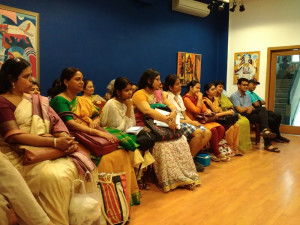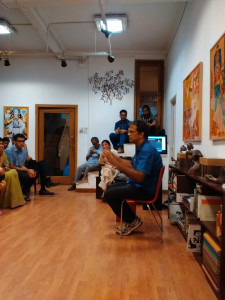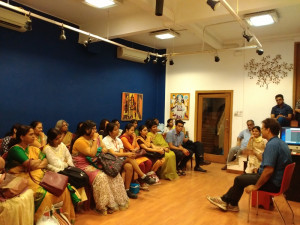‘ Go home and think about how many of your friends are different from you.’ Jerry told the audience towards the end of his talk. We don’t realise this, but very often we tend to gravitate towards people who are in some ways similar to us, losing out on difference—difference that will make us richer human beings.
Jerry Pinto, author, poet and translator, was with us for an evening of discussion over many issues—stemming from his life experience as teacher, author, translator, storyteller, social activist and above all someone who is deeply curious about human beings. The second in the series of talks as a part of History for Peace, a PeaceWorks project, the audience comprised educators, researchers, college goers and school students.
A large part of the two hour talk was focussed around Baluta, the seminal autobiography of Daya Pawar, a Dalit from the Mahar community in Maharashtra, first published in 1978. Translated by Jerry, this is now available for readers in English. The book is a candid telling of an individuals search for his identity in communities that see differences as part of the backbone of society, and not in a positive way. A book that broke years of silence, and was, at the time of publishing criticised by the community it described for, in effect, airing dirty laundry. Pawar talks about his experience of being alienated by his own community because they didn’t read, an activity ‘restricted ‘to the Brahmin community. This gives reading a caste colour, a right only for the upper caste.
Jerry spoke of his experiences conducting surveys in schools in Maharashtra, based on what can be classified as a good student. Surprisingly, or perhaps not, the overwhelming response was that a good student is one that is clean, who doesn’t question the teacher, who is quiet in class. A ‘poor’ child is fundamentally dirty because his or her parent cannot keep them clean. Children in the Mahar community described in the book, have to bring their own gunny sack to sit on—so that they don’t dirty the floor.
The book also describes communities in Mumbai. Jerry spoke about the city he calls home, the changes after the riots, and how the sentiment of ‘us and them’ has increased drastically. This sentiment can be addressed in classrooms, where it is the duty of the teacher to create a protective space for students for discussion.
An observation by one of the teachers, which resonated with everyone in the audience, was that as a teacher, one often takes into the classroom social sensibilities that one is brought up with. Every class is different, because the teacher teaching that class is ‘colouring’ it with personal experiences, making the creating of spaces for children to discuss and debate about the world they live in, a struggle. In response to that, Jerry spoke of the need to examine carefully what one, as a teacher, believes to be true. The ability to dissent is an ability that is not, in any way, encouraged in students, and to therefore, treat any students who does argue, or show dissent, as a gift.
Video clips from the session are available on YouTube. Please click here. Another video is available here
–Paroma Sengupta



